BMW i4 vs Mercedes EQS SUV – Which car suits you better?
Everyday use, family trips or long-distance drives – here’s where the differences show.
Discover whether BMW i4 or Mercedes EQS SUV fits your lifestyle better.
Costs and Efficiency:
When it comes to price and running costs, the biggest differences usually appear. This is often where you see which car fits your budget better in the long run.
BMW i4 has a significantly advantage in terms of price – it starts at 49400 £, while the Mercedes EQS SUV costs 95000 £. That’s a price difference of around 45601 £.
In terms of energy consumption, the advantage goes to the BMW i4: with 14.70 kWh per 100 km, it’s clearly perceptible more efficient than the Mercedes EQS SUV with 19.60 kWh. That’s a difference of about 4.90 kWh.
As for range, the Mercedes EQS SUV performs to a small extent better – achieving up to 695 km, about 82 km more than the BMW i4.
Engine and Performance:
Power, torque and acceleration are the classic benchmarks for car enthusiasts – and here, some clear differences start to show.
When it comes to engine power, the Mercedes EQS SUV has a minimal edge – offering 658 HP compared to 601 HP. That’s roughly 57 HP more horsepower.
In acceleration from 0 to 100 km/h, the BMW i4 is somewhat quicker – completing the sprint in 3.70 s, while the Mercedes EQS SUV takes 4.40 s. That’s about 0.70 s faster.
In terms of top speed, the BMW i4 performs hardly perceptible better – reaching 225 km/h, while the Mercedes EQS SUV tops out at 210 km/h. The difference is around 15 km/h.
There’s also a difference in torque: Mercedes EQS SUV pulls slightly stronger with 950 Nm compared to 795 Nm. That’s about 155 Nm difference.
Space and Everyday Use:
Beyond pure performance, interior space and usability matter most in daily life. This is where you see which car is more practical and versatile.
Both vehicles offer seating for 5 people.
In curb weight, BMW i4 is noticeable lighter – 2070 kg compared to 2695 kg. The difference is around 625 kg.
In terms of boot space, the Mercedes EQS SUV offers evident more room – 645 L compared to 470 L. That’s a difference of about 175 L.
In maximum load capacity, the Mercedes EQS SUV performs clearly perceptible better – up to 2100 L, which is about 810 L more than the BMW i4.
When it comes to payload, Mercedes EQS SUV somewhat takes the win – 570 kg compared to 480 kg. That’s a difference of about 90 kg.
Who comes out on top?
Overall, the BMW i4 shows itself to be has the upper hand and secures the title of DriveDuel Champion.
It convinces with the more balanced overall package and proves to be the more versatile choice for everyday use.
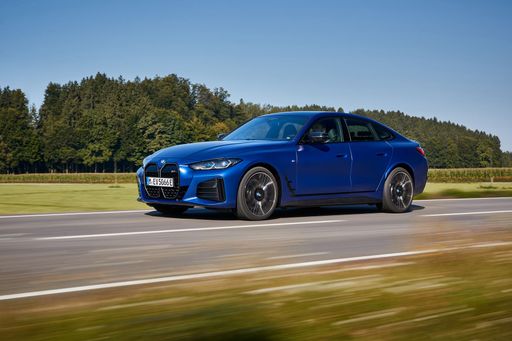
BMW i4
BMW i4
The BMW i4 beautifully merges the dynamism of a saloon with the efficiency of an electric vehicle, offering a truly exhilarating driving experience. Its design seamlessly blends elegance and athleticism, highlighting BMW's dedication to both aesthetics and performance. Inside, the i4 boasts a high-tech cockpit that harmonises luxury with intuitive technology, allowing drivers to stay connected while on the move.
details @ press.bmwgroup.com
@ press.bmwgroup.com
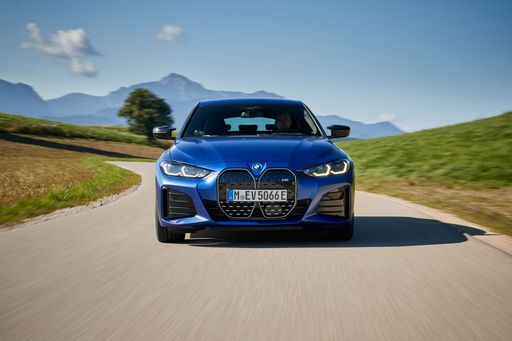 @ press.bmwgroup.com
@ press.bmwgroup.com
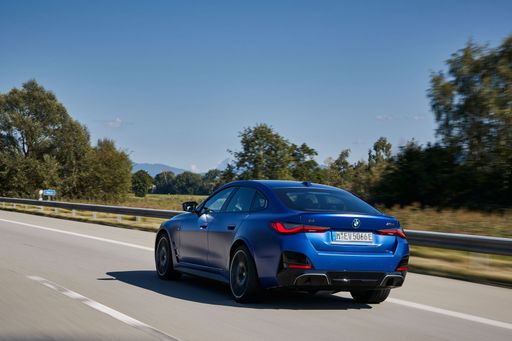 @ press.bmwgroup.com
@ press.bmwgroup.com
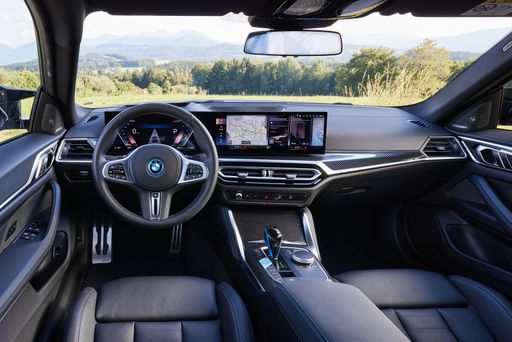 @ press.bmwgroup.com
@ press.bmwgroup.com
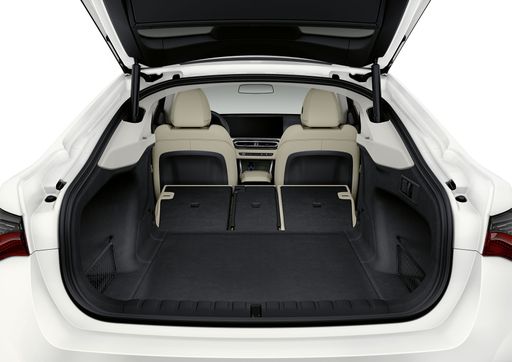 @ press.bmwgroup.com
@ press.bmwgroup.com
Mercedes EQS SUV
The Mercedes-Benz EQS SUV redefines luxury in the electric vehicle segment with its elegant design and cutting-edge technology. Its spacious interior provides exceptional comfort, featuring high-quality materials and innovative ambient lighting to create a serene driving environment. This SUV impressively combines sustainability with performance, offering a smooth and quiet ride without compromising on power.
details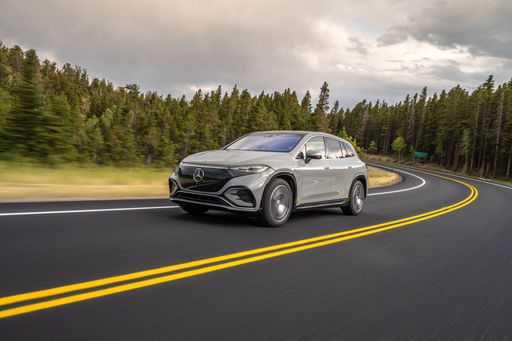 @ group-media.mercedes-benz.com
@ group-media.mercedes-benz.com
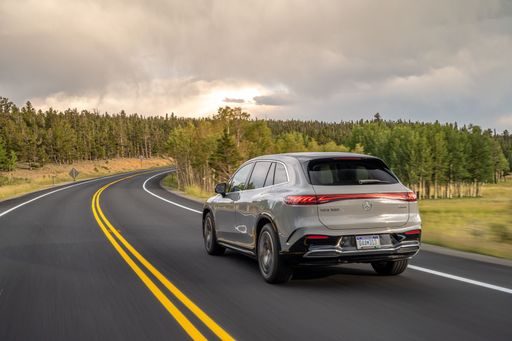 @ group-media.mercedes-benz.com
@ group-media.mercedes-benz.com
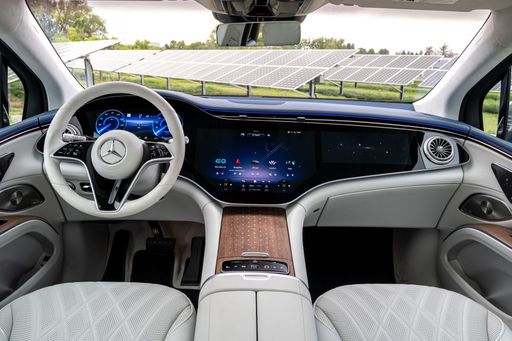 @ group-media.mercedes-benz.com
@ group-media.mercedes-benz.com
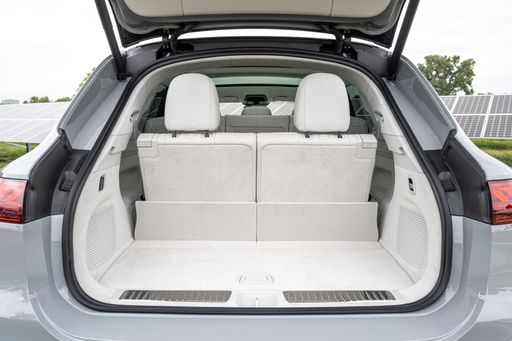 @ group-media.mercedes-benz.com
@ group-media.mercedes-benz.com

|

|
|
|
|
Costs and Consumption |
|
|---|---|
|
Price
49400 - 62500 £
|
Price
95000 - 212100 £
|
|
Consumption L/100km
-
|
Consumption L/100km
-
|
|
Consumption kWh/100km
14.7 - 16.7 kWh
|
Consumption kWh/100km
19.6 - 21.9 kWh
|
|
Electric Range
514 - 613 km
|
Electric Range
615 - 695 km
|
|
Battery Capacity
67.1 - 81.3 kWh
|
Battery Capacity
108.4 - 118 kWh
|
|
co2
0 g/km
|
co2
0 g/km
|
|
Fuel tank capacity
-
|
Fuel tank capacity
-
|
Dimensions and Body |
|
|---|---|
|
Body Type
Hatchback
|
Body Type
SUV
|
|
Seats
5
|
Seats
4 - 5
|
|
Doors
5
|
Doors
5
|
|
Curb weight
2070 - 2285 kg
|
Curb weight
2695 - 3075 kg
|
|
Trunk capacity
470 L
|
Trunk capacity
440 - 645 L
|
|
Length
4783 mm
|
Length
5125 mm
|
|
Width
1852 mm
|
Width
1959 - 2034 mm
|
|
Height
1448 mm
|
Height
1718 - 1721 mm
|
|
Max trunk capacity
1290 L
|
Max trunk capacity
2100 L
|
|
Payload
445 - 480 kg
|
Payload
425 - 570 kg
|
Engine and Performance |
|
|---|---|
|
Engine Type
Electric
|
Engine Type
Electric
|
|
Transmission
Automatic
|
Transmission
Automatic
|
|
Transmission Detail
Reduction Gearbox
|
Transmission Detail
Reduction Gearbox
|
|
Drive Type
Rear-Wheel Drive, All-Wheel Drive
|
Drive Type
All-Wheel Drive, Rear-Wheel Drive
|
|
Power HP
286 - 601 HP
|
Power HP
360 - 658 HP
|
|
Acceleration 0-100km/h
3.7 - 6 s
|
Acceleration 0-100km/h
4.4 - 6.8 s
|
|
Max Speed
190 - 225 km/h
|
Max Speed
210 km/h
|
|
Torque
400 - 795 Nm
|
Torque
568 - 950 Nm
|
|
Number of Cylinders
-
|
Number of Cylinders
-
|
|
Power kW
210 - 442 kW
|
Power kW
265 - 484 kW
|
|
Engine capacity
-
|
Engine capacity
-
|
General |
|
|---|---|
|
Model Year
2025
|
Model Year
2024
|
|
CO2 Efficiency Class
A
|
CO2 Efficiency Class
A
|
|
Brand
BMW
|
Brand
Mercedes-Benz
|
What drivetrain options does the BMW i4 have?
The BMW i4 is available as Rear-Wheel Drive or All-Wheel Drive.
The prices and data displayed are estimates based on German list prices and may vary by country. This information is not legally binding.
